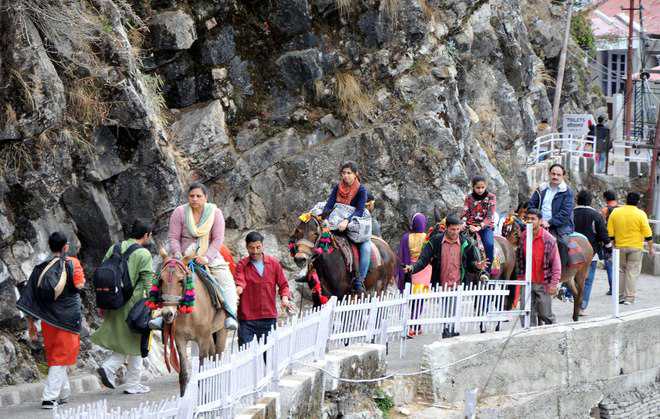New Delhi, November 26
The Supreme Court on Monday asked the Central Empowered Committee (CEC) to look into the aspects of reduction of mules, implanting of radio frequency identification (RFID) tags and disposal of solid waste management at the Mata Vaishno Devi shrine.
The SC asked the CEC to file its response in eight weeks. A bench of Justices MB Lokur and Deepak Gupta said the CEC would also look into the allegations that dead mules were thrown into the river after throwing them from the cliff.
Senior advocate Krishnan Venugopal, appearing for petitioner activist Gauri Mulekhi, said a committee should be constituted to look into all the aspects. The bench also asked the Ministry of Environment, Forest and Climate Change, J&K Government, Shri Mata Vaishno Devi Shrine Board to file their responses on the issues flagged by the petitioner. Venugopal said the RFID tags used were of plastic and could be easily tampered.
The bench said the CEC would look into the aspect of disposal of solid waste generated by mules, installation of permanent RFID tag, reduction of mules from 4,600 to 2,500 and suggestion should be made to further reduce the number to zero.
On September 18, the apex court was told that the mules operating on the Katra-Vaishno Devi shrine track in Jammu would soon be implanted with RFID tags to ensure that no illegal or unauthorised animal was pressed into service. In a report placed before the apex court, the sub-committee of the State Administrative Council has recommended that the cap on registered mules operating on the track would be reduced from 4,600 to 2,500 over a period of 10 years and 175 animals would be phased out every year, starting 2018-19.
As part of the long-term measures to deal with the issue of rehabilitation of mules and their owners, the panel has recommended that after the number of animals is capped at 2,500, the Shri Mata Vaishno Devi Shrine Board and the district administration would ensure that the number of mules on the track did not exceed 2,000 on a single day.
It has recommended that the state’s animal husbandry department would constitute a task force and create an institutional mechanism to ensure control on spread of zoonotic disease in equines at Katra and the shrine area. — PTI
Unlock Exclusive Insights with The Tribune Premium
Take your experience further with Premium access.
Thought-provoking Opinions, Expert Analysis, In-depth Insights and other Member Only Benefits
Already a Member? Sign In Now










